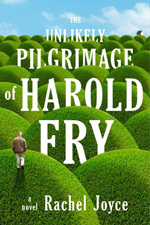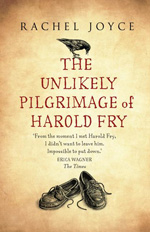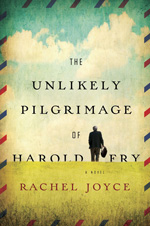
THE UNLIKELY PILGRIMAGE OF HAROLD FRYE
Reviewed by Tad Deffler
One day Harold Fry, a retiree getting on in years, sets off to post a letter of condolence to a former friend, Queenie Hennessey, who is dying of cancer. He hasn't seen her in twenty years and can manage only, "I'm sorry." At the first letter box, he decides that he isn't quite ready to let go of it, so he walks to the next...then, the one after that…until a strange notion takes him: he drops the letter in the mail, goes into a phone booth and calls to say, "Tell Queenie I'm walking to see her and not to die before I get there." And so begins a journey of over 600 miles in boat shoes and tie, with only the vaguest idea of where he is going. The tale of that journey is, by turns, light-hearted, unsparing, comical, poignant and, generally, captivating.
The endorsement snippets and the letter from Random House printed inside the advance reader copy told me that this is a novel about faith. Perhaps many will see it that way. Though distinctly unreligious, Harold has faith that his walking is keeping Queenie alive. Against all common sense, and against the opinions of family and doctors, he cannot shake this fundamental conviction. Along the way, he is surprised to discover this faith slowly extending outward to a belief in basic human kindness and that providence will provide everything he needs for his journey.
Other readers (aided, perhaps, by the quote from Bunyan's The Pilgrim's Progress that begins the book) will find an allegorical tale of a man's journey through life as Harold uses his time to recall and ponder upon his childhood, his professional life, his largely defunct marriage, and his relationship with his son.
When all was done, however, I was left with a different notion: the idea that this was a story about a man connecting with his own humanity. Harold spent a lifetime watching from sidelines, barely relating to his family, colleagues and friends. For all that time, he was sure that this was because he was inadequate, that his insecurities and pains made him less than everyone else.
Now, he feels compelled to listen to the stories strangers tell him, both as repayment for their largesse and as atonement for the many mistakes he has made in his life. As he does so, he comes to realize that he has been wrong:
The silver-haired gentleman was in truth nothing like Harold had first imagined him to be.
He was a chap like himself, with a unique pain; and yet there would be no knowing that if you
passed him on the street…It must be the same all over England. People were buying milk, or
filling their cars with petrol, or even posting letters. And what no one else knew was the
appalling weight of the thing they were carrying inside. The inhuman effort it took sometimes
to be normal, and a part of things that appeared both easy and everyday.
Joyce doesn't use action to hold your interest—forgive me for revealing enough to say that Harold never performs heroics nor is he ever mugged. Neither does she rely upon surprise; the twists that occur in the plot are things you somehow knew were coming. Instead, she relies upon her capacity to convey what it means to be human.
It's not, however, a book without flaws. Harold loses his way—and, to some extent, the attention of the reader—some two-thirds through the book as he meanders purposelessly through northern England. A few of the secondary characters don't ring quite true; there's a hint of caricature to them that reminded me of similar roles in the movie Forrest Gump. Yet these are counterbalanced by characters you think will be flat but who surprise you, such as the annoying neighbor who is able to crystallize loss into words, or the immigrant physician who articulates the line between faith and hopelessness.
In The Unlikely Pilgrimage of Harold Fry, her first novel, radio playwright Rachel Joyce has created something that might not be labeled grand or compelling; yet I picked it up, read straight through until I was finished, and thought my time was well-spent.

Random House, hardcover, 9780812993295

Doubleday, hardcover (UK), 9780857520647

Bond Street Books (CAN), hardcover, 97803856776911
